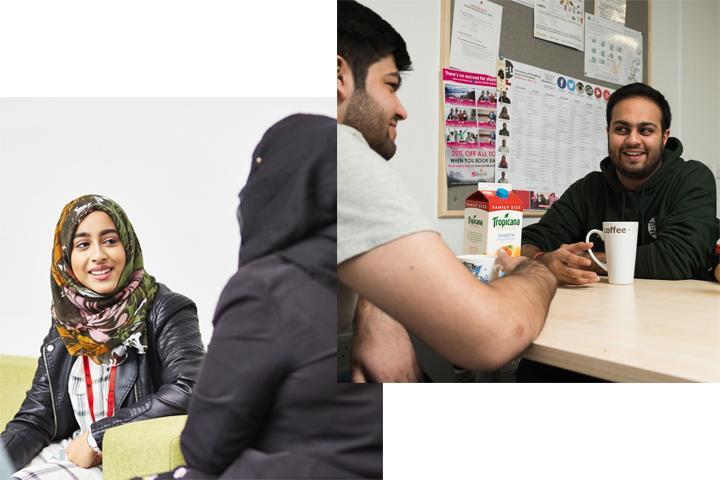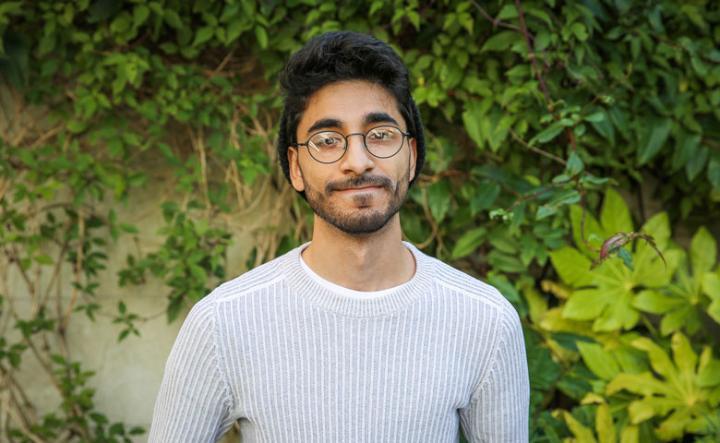
Asim Hussain
LLB Law
Asim graduated with an LLB Law degree in summer 2019. Since graduating he has completed training to provide mentoring support to care-leavers studying at the University of Bradford.
Asim spoke to us about how his own experience inspired him to get involved with the mentoring programme, and how he hopes to help other students in the future.
What have you been doing since graduation?
"I've been looking at graduate jobs and 'normal' jobs which require a degree.
"I've looked at banking jobs, legal jobs, and I'm interested in a graduate role at Aldi. They do a good scheme and are enthusiastic about graduates who are ambitious and keen to progress."
"I feel that studying law has helped me to aim high, speak more clearly and focus on being articulate.
"It's opened up a lot of pathways for me. Hopefully, these skills are going to help me to get graduate jobs, to progress and to be successful."
Law was a good fit for me because I'm happy talking about things, reaching out to people and deciding what's right and wrong. It's taught me to look at my options, not to figure out what's easy, but to figure out what's best. I believe the more you enjoy something, the better you'll do.
Asim Hussain
You're also involved in a mentoring programme for care leavers?
"Yes, I recently completed a full day of training to be a mentor for first-year care leavers.
"We're going to be working with first-year students who are literally leaving home from a care home and progressing to university.
"They don't necessarily stay in contact with the people who have taken care of them or the friends they had, so I would underline that they are often alone."
What are the aims of the mentoring programme?
"The focus of the mentoring programme is to help the students become self-sufficient and independent.
"We will try to figure out how to help them progressively. For example, if a student is struggling with time management we can work out a timetable, or figure out when the best time is for them to focus.
"We can help them to think about what they can do to answer their own questions, rather than us just giving them the answers.
"For example, hearing that somebody is struggling with an assignment we can ask 'well, what can we do to fix that struggle?'
"It's not a question they'll necessarily ask themselves when they're all alone. They'll probably focus on the fact that they aren't doing great, and leave it at that."

At university, there's an expectation of having friends and family. Some students, especially care leavers, don't necessarily have that, and sometimes when you're on your own and not doing so great you just need somebody to hear you out.
Asim Hussain
What inspired you to get involved with the mentoring programme?
"I know that university can be a struggle for a lot of people, we have issues in different forms.
"From my own experience - things didn't really work out with my parents and I was moved over to my grandparents from the age of nine. I had only seen them about once a month so they weren't necessarily familiar to me.
"There were times when I felt alone and that I didn't quite fit in."
"I don't feel that way now because my grandparents have done a great job, and my uncle and auntie, they've done everything to make me feel better.
"But I realised that some students don't have that support. I think back to the small times when I felt alone - it might be a large amount of time for them.
"I feel that I want to do my part to help out, to use my own experience as an example that if I can manage, you can more than manage."
Did you receive any support as a student?
"Yes, I did. I had a lot of support from my friends. There was a time when I felt like I wasn't able, and people were telling me 'look, you've made it this far, there must be a reason. You wouldn't have got into university if you weren't capable'.
"I'll be using those exact words for somebody else, to help them see for themselves that they are very much capable.
"Even in the face of all the adversity they've had, they've made it this far and they'll make it even further."

What do you hope to get out of the mentoring experience?
"I'm hoping to help somebody progress - even to help just one person to really believe in themselves a little bit more than they did yesterday.
"I also feel it will teach me skills and ways to adapt to people who come from a difficult background. It might be extremely difficult, but that's something I'm going to learn to cope with.
"It's going to teach me how to use a balance of empathy and encouragement. At the end of the day, we're not going to be there as counsellors because that's a job for somebody else. We're going to be there to listen, be empathetic and use our own experiences to help someone."
As mentors, we're hoping to put into perspective that university doesn't necessarily need to be difficult, you're not on your own, you have support and you are very much capable.
Asim Hussain
Find out more
There are a range of peer support schemes open to our students, including peer mentoring.
If you would like to find out more, please contact Ruth Lefever.
